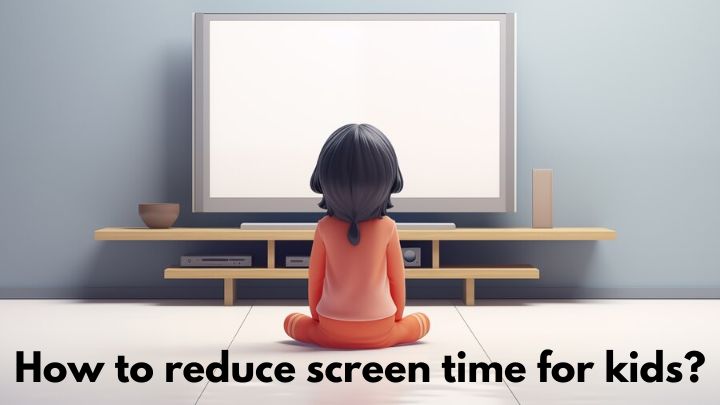
Screen time is a concern for all parents whose children use multiple digital devices. Whether it’s the TV, games, mobile phones, or other devices, excessive screen time for your child can be dangerous. In this blog article, we will share practical tips and guide regarding how to reduce screen time for kids.
While you can set screen time limits for children, it may not be sufficient. Empowering your child with screen time management skills is a better approach. As a parent, you need to find a healthy balance between screen-based activities and unplugged experience.
Why should you teach your child about screen time management?
Considering the significant increase in the use of digital devices, it’s crucial to help your child understand the importance of time management and limited screen usage. Educating them about the value of time and encouraging time management skills will eventually enable them to better manage their daily routines and reduce excessive screen exposure. It might be challenging at first, but the results will be worthwhile.
While technology offers undeniable benefits, excessive screen time can negatively impact a child’s development, sleep, and even physical health. Too much of screen time is very harmful for their growing minds and bodies.
Setting screen time limits helps your child sleep well and feel their best to play, learn, and grow. Managing screen time opens the door to these real-life adventures like playing with friends. Playing with friends face-to-face is the best way to learn how to talk, share, and be a good teammate.
Best tips and guide to reduce screen time for kids
Training your child to excel in time management skills, whether it’s for screen time, leisure, or work, can be tricky. However, if you succeed, the results will be impressive and invaluable. We will show you ways to gently nudge them away from screens and push to the activities of playing outside, building things, and hanging out with friends and family.
Educating your children about time management tips and its significance is crucial. Providing them with practical examples of how time limitations for tasks or activities can help them maximize their day is essential. Offer examples in smaller activities, demonstrating how organizing everything can instill this habit. Don’t forget to emphasize the importance of time management skills in daily activities or punctuality.
1. Creating a schedule and setting realistic limits
Expecting your child to improve their time management skills without guidance is unreasonable. You must guide them by establishing schedules and limits. However, ensure that these limits are somewhat realistic.
Apply the schedule to the entire household, not just the child. This approach helps them view it as a collective effort, rather than solely their responsibility. A basic schedule includes wake-up times, meal schedules, work or school timings, study periods, leisure time, and screen time. While the limits for each individual may differ based on age or the nature of their activities, the schedule should remain consistent.
2. Ensuring everyone adheres to the schedule
If you want your child to improve their time management and screen time habits, set an example for them. After implementing rules and schedules, make a point to adhere to them yourself. Avoid bending the rules or exceeding time limits just because you’re an adult or guardian. Instead, stick to the established limitations. Use relaxation or flexibility only when the situation truly calls for it.
By doing this, you encourage your child to recognize the importance of following schedules and not allowing any exceptions. They will consciously abide by these limits, much like you do, and will seek additional relaxation or extra time sparingly.
3. Creating screen free zones
Within your home, it’s important to designate certain areas as screen-free zones, such as the dining area, study area, outdoor play area, and others. These zones are meant for family interaction or concentrating on important activities. This space will help a lot to reduce screen time for kids.
These designated areas help your child limit screen time when they are present in them. Automatically, children will reduce their screen consumption, focusing on essential tasks like eating, studying, or playing, promoting healthier and more productive habits. You should also encourage your kids to read books in their leisure time. It will open an entire new world to them.
4. Teaching children to prioritize
It is quite common to observe that your child may not prioritize important things, but instead, they chase after games or fun activities. In such situations, it’s essential to help them develop the skill of prioritization. Such skill will help them in their coming age also.
Enable your child to value and weigh tasks according to a priority list. Activities such as studying, resting, eating, and outdoor activities should be given the highest priority, while screen activities can come later. You need to make sure that these are not forced. They must understand the importance of it and do it by themselves.
5. Emphasizing quality over quantity
To establish a more effective screen time management routine, let your child understand that spending hours with electronic devices is not necessary. Instead, the key is to spend limited but enjoyable time. This concept encourages efficient utilization of reduce screen time for kids, even within limits.
It helps children focus only on important and essential apps or games, automatically avoiding frivolous content that may appear attractive but lacks productivity. Prioritizing quality over quantity will guide them towards paying attention only to significant digital activities.
6. Suggesting regular breaks
Just like muscles get tired after too much exercise, brains need breaks too. Stepping away from the screen helps your child’s brain recharge, making it easier to focus and learn new things when they come back. Taking breaks gives your child’s eyes a chance to rest and relax.
Sitting still for too long isn’t fun for anyone, especially energetic kids. Screen breaks are the perfect things for them. Challenge your child to a quick dance party, build a pillow fort, or grab a ball and play catch.
7. Utilizing parental control tools
Consider using the FamilyTime parental control app to set screen time limits on your child’s device. This app enables your child to adhere to the schedule and limitations for device usage. It can also block devices after a certain time, making it easier for your child to avoid excessive use.
Parental control tools can act like website restrictors, filtering out content you don’t want them to see. This helps you create a safe online environment where they can explore age-appropriate websites and games. This helps to reduce screen time for kids and making sure that they’re using apps that are safe and educational. As a whole, such system helps them understand healthy screen habits and prevents them from getting glued to the screen all day.
8. open to review and revise rules
Remember that rules should not be blindly implemented but carefully managed. It’s essential for you to periodically review all the rules and make necessary modifications for better implementation and optimal results.
All these must not replace open communication. Talk to your child about online safety, the importance of balance, and the reasons behind the rules you set. It will give them a holistic idea behind all such restrictions.
Conclusion
Assisting your children in developing their screen time management skills is not a difficult task. By providing them with appropriate support and establishing some rules, you can help them adopt moderation in screen time usage.
Alongside managing digital device usage, children will also learn valuable time management skills to enhance discipline in their lives.
